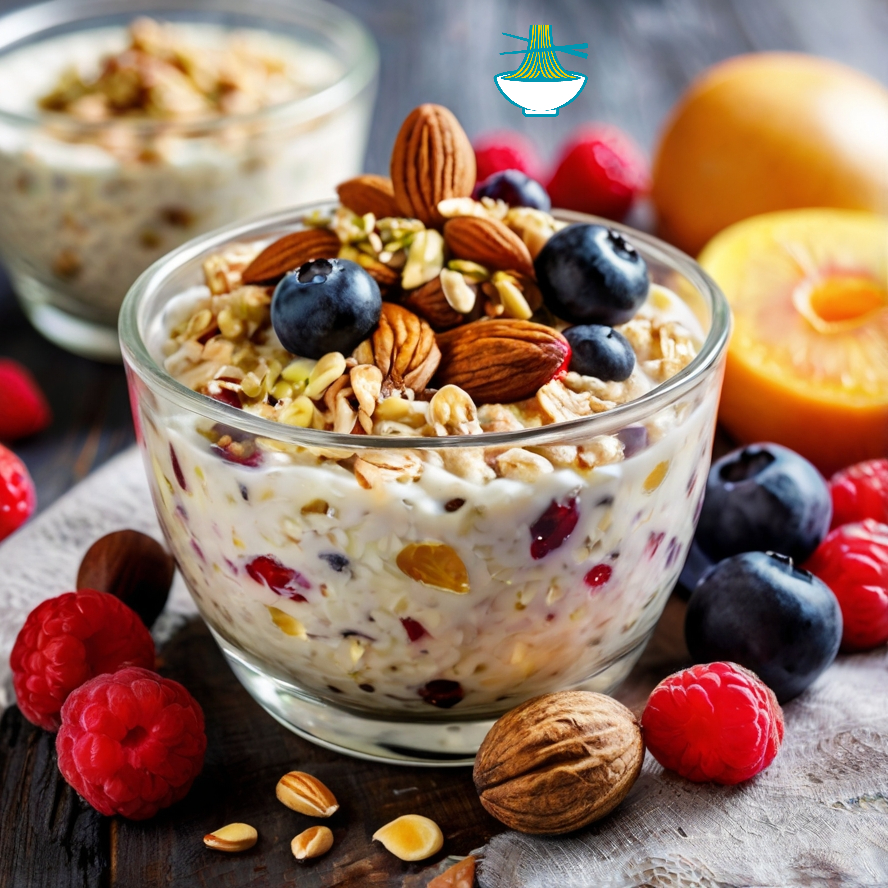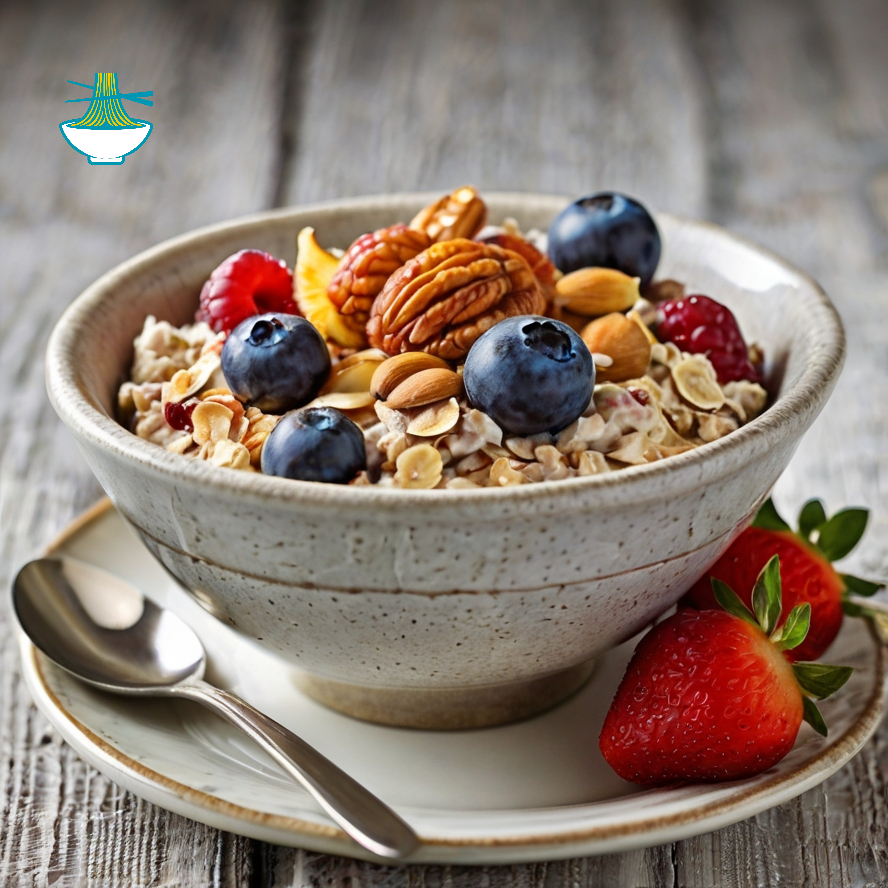Bircher Müesli is a nutritious cold oatmeal dish that combines oats with fresh fruits and nuts. Packed with dietary fiber, antioxidants, and essential vitamins, it provides a perfect start to your day. The oatmeal base supports digestive health, while the fruits offer vitamin C and antioxidants, crucial for immune function. The addition of nuts contributes healthy fats, which are vital for heart health and maintaining good cholesterol levels. However, while this dish is healthy, it's important to enjoy it in moderation, as the calories from nuts and dried fruits can add up quickly. Overall, Bircher Müesli offers a balanced and wholesome way to nourish the body with essential nutrients, making it an excellent choice for a morning boost.
Ingredients:
- 1 cup rolled oats
- 1 cup milk (or dairy-free alternative)
- 1/2 cup yogurt
- 1 apple, grated
- 1/4 cup almonds, chopped
- 1/4 cup raisins
- 1 tablespoon honey (optional)
- Fresh berries (optional for topping)
Instructions:
- Combine the oats, milk, and yogurt in a bowl. Stir well and cover. Let it soak in the refrigerator for at least 4 hours, preferably overnight.
- Grate the apple and fold it into the soaked oatmeal mixture.
- Add chopped almonds, raisins, and honey (if using). Stir to combine.
- Serve the Bircher Müesli chilled, topped with fresh berries of your choice.
Varied Preparation Methods
Bircher Müesli can be made in different ways to suit various dietary preferences, especially for those who need dairy-free or allergen-free options.
- Dairy-Free Alternatives: Instead of regular milk and yogurt, you can use plant-based options like almond milk, oat milk, or coconut milk. For the yogurt, there are numerous non-dairy yogurts available made from coconut, almond, or soy, which still provide the creamy texture without any dairy.
- Nut-Free Version: For those with nut allergies, simply replace the almonds with seeds like chia seeds, sunflower seeds, or pumpkin seeds. These seeds will offer similar benefits in terms of healthy fats and nutrients.
- Low-Sugar Option: If you're watching your sugar intake, you can omit the honey or use a natural sugar substitute like stevia or monk fruit. You can also add more low-sugar fruits like berries instead of dried fruits like raisins, which can be high in sugar.
Balancing the Recipe for Various Diets
Bircher Müesli is an adaptable dish that can be modified to fit specific dietary requirements.
- Low-Carb Diets: To make the dish lower in carbohydrates, you can replace the oats with a lower-carb alternative, such as flaxseeds, chia seeds, or shredded coconut. These alternatives provide a similar texture while reducing the overall carb content.
- Sugar-Free Diets: For those following a sugar-free diet, you can avoid sweeteners like honey or raisins. Instead, incorporate more unsweetened fruits like berries or apple slices for natural sweetness.
- High-Protein Option: To increase the protein content, consider adding a scoop of protein powder (whey, pea, or hemp) to the mixture or topping with extra seeds and nuts.
Creative Variations for a More Diverse Meal
Bircher Müesli is an excellent base that can be easily customized to keep meals exciting and fresh.
- Add More Fruits: While the classic recipe calls for apples and berries, you can incorporate other fruits such as bananas, pears, or stone fruits (like peaches and plums) for extra flavor and nutrients.
- Incorporate Spices: Adding spices like cinnamon, nutmeg, or cardamom can give the dish a unique twist and boost its antioxidant content.
- Superfood Boosters: You can enrich Bircher Müesli with superfoods like goji berries, spirulina powder, or cacao nibs. These ingredients enhance the nutrient profile and offer additional health benefits.
Recommended Serving Sizes
For optimal health benefits, it’s important to be mindful of portion sizes when consuming Bircher Müesli.
- Standard Serving: A typical serving of Bircher Müesli is around 1 cup (240g) of the soaked mixture, which provides a balanced amount of calories, fiber, and protein. This can serve as a satisfying breakfast or snack.
- Meal vs. Snack: If you're using it as a main meal, you might want to pair it with additional protein or healthy fats (like a boiled egg or avocado) to ensure you're getting a complete, filling meal. If it's a snack, a smaller portion (around ½ cup) is sufficient to keep you energized without overloading on calories.
Frequently Asked Questions (FAQs)
Can Bircher Müesli be eaten as a main meal or is it just a snack?
- Bircher Müesli can be enjoyed as both a main meal or a snack. When served as a main meal, consider pairing it with additional protein or healthy fats to make it more filling. As a snack, it provides a nutritious boost without being too heavy.
Can I replace milk or yogurt with other ingredients?
- Yes, you can easily substitute dairy milk with almond milk, coconut milk, or oat milk, and replace the yogurt with dairy-free alternatives like coconut yogurt or almond yogurt.
Does Bircher Müesli contain added sugar?
- The traditional recipe includes honey, but you can reduce or eliminate added sugars by using fruit for natural sweetness. Honey can also be replaced with a natural sweetener like stevia or maple syrup for a healthier option.
What are suitable substitutes for those with allergies?
- If you have nut allergies, consider using seeds like chia seeds or sunflower seeds instead of almonds. For dried fruit allergies, fresh or frozen berries can be a great replacement. Always adjust based on your specific needs.
What are the benefits of Bircher Müesli for athletes?
- Bircher Müesli is an excellent choice for athletes due to its combination of carbohydrates, fiber, and protein. The oats provide slow-releasing energy, the nuts offer healthy fats, and the yogurt contributes protein, making it ideal for post-workout recovery.

Nutritional values and benefits:
1 Cup Rolled Oats (90g)
- Calories: 150
- Carbohydrates: 27g
- Protein: 5g
- Fat: 3g
- Sodium: 0mg
- Cholesterol: 0mg
- Vitamins:
- Vitamin B1 (Thiamine): 0.2mg (15% DV)
- Vitamin B5 (Pantothenic Acid): 0.5mg (10% DV)
- Minerals:
- Iron: 1.6mg (9% DV)
- Magnesium: 56mg (14% DV)
- Benefit: Oats are high in beta-glucan fiber, which helps lower cholesterol levels and improve heart health. The magnesium in oats helps regulate muscle function, while the B vitamins support energy production and nervous system health.
1 Cup Milk (240ml, Whole Dairy)
- Calories: 150
- Carbohydrates: 12g
- Protein: 8g
- Fat: 8g
- Sodium: 98mg
- Cholesterol: 24mg
- Vitamins:
- Vitamin D: 120 IU (30% DV)
- Vitamin A: 345 IU (7% DV)
- Minerals:
- Calcium: 276mg (28% DV)
- Potassium: 322mg (9% DV)
- Benefit: Milk is an excellent source of calcium for strong bones and teeth. The protein in milk supports muscle growth and repair, and the vitamin D enhances calcium absorption. The potassium helps regulate blood pressure.
1/2 Cup Yogurt (120g, Plain, Low-fat)
- Calories: 60
- Carbohydrates: 6g
- Protein: 5g
- Fat: 2g
- Sodium: 50mg
- Cholesterol: 5mg
- Vitamins:
- Vitamin B12: 1.1mcg (19% DV)
- Minerals:
- Calcium: 150mg (15% DV)
- Phosphorus: 100mg (10% DV)
- Benefit: Yogurt is rich in probiotics that promote gut health and digestion. It is also a great source of calcium, which contributes to bone strength, and vitamin B12, which is crucial for red blood cell formation and nerve function.
1 Medium Apple (182g)
- Calories: 95
- Carbohydrates: 25g
- Protein: 0.5g
- Fat: 0.3g
- Sodium: 1mg
- Cholesterol: 0mg
- Vitamins:
- Vitamin C: 8.4mg (14% DV)
- Minerals:
- Potassium: 195mg (6% DV)
- Benefit: Apples are a rich source of soluble fiber, which supports digestive health. The vitamin C boosts immune function, and the potassium helps maintain proper heart and muscle function.
1/4 Cup Almonds (35g)
- Calories: 160
- Carbohydrates: 6g
- Protein: 6g
- Fat: 14g
- Sodium: 0mg
- Cholesterol: 0mg
- Vitamins:
- Vitamin E: 7.3mg (37% DV)
- Minerals:
- Magnesium: 76mg (19% DV)
- Calcium: 75mg (8% DV)
- Benefit: Almonds are packed with healthy fats, particularly monounsaturated fat, which supports heart health. The vitamin E acts as an antioxidant, protecting cells from oxidative damage, and magnesium supports bone health and muscle function.
1/4 Cup Raisins (40g)
- Calories: 130
- Carbohydrates: 34g
- Protein: 1g
- Fat: 0g
- Sodium: 5mg
- Cholesterol: 0mg
- Vitamins:
- Vitamin C: 1.4mg (2% DV)
- Minerals:
- Iron: 1.4mg (8% DV)
- Benefit: Raisins are rich in iron, helping prevent anemia and promoting healthy blood circulation. They also contain antioxidants, such as polyphenols, which protect the body against oxidative stress.
1 Tbsp Honey (21g)
- Calories: 64
- Carbohydrates: 17g
- Protein: 0g
- Fat: 0g
- Sodium: 1mg
- Cholesterol: 0mg
- Vitamins:
- Vitamin C: 0.2mg (0% DV)
- Minerals:
- Potassium: 11mg (0% DV)
- Benefit: Honey is a natural source of antioxidants that help reduce inflammation and support overall health. It also has antimicrobial properties and can soothe sore throats and digestive issues.
Fresh Berries (optional, 50g mixed berries)
- Calories: 30
- Carbohydrates: 8g
- Protein: 0g
- Fat: 0g
- Sodium: 0mg
- Cholesterol: 0mg
- Vitamins:
- Vitamin C: 14mg (23% DV)
- Minerals:
- Potassium: 110mg (3% DV)
- Benefit: Berries are loaded with antioxidants, which protect cells from damage. They also provide high levels of vitamin C, which strengthens the immune system and improves skin health.
By combining all these ingredients, Bircher Müesli provides a balanced mix of macronutrients and micronutrients that support digestive health, boost immunity, promote heart health, and maintain overall vitality.


Comments